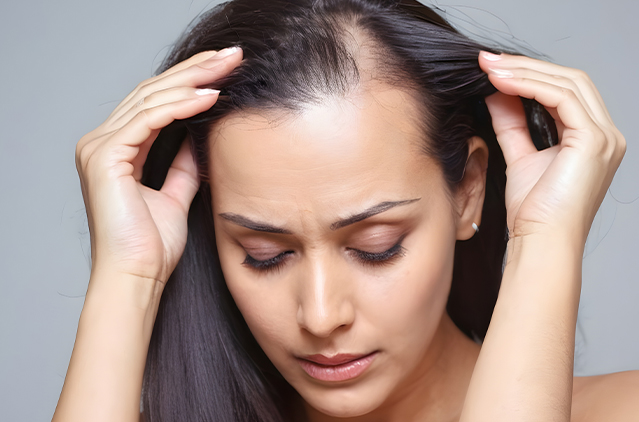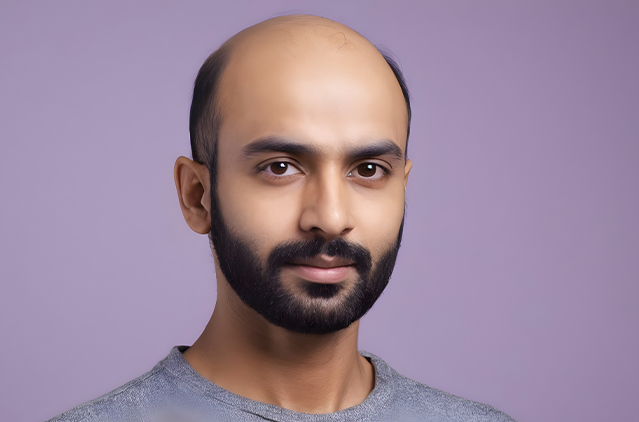
Millions of individuals worldwide, irrespective of age, gender, or ethnicity, struggle with hair loss. Hair loss may be extremely detrimental to one’s self-esteem and confidence, whether it occurs gradually or suddenly. It is critical for those experiencing hair loss to understand the causes, treatments, and coping mechanisms associated with this illness. Analysing the complexities surrounding hair loss can help identify tailored treatments, ranging from medical conditions and lifestyle choices to hereditary predispositions. This article explores the best treatment options available for treating hair loss in men and women. Read along to know more.
Understanding Hair Loss
Before diving into the various courses, it’s critical to understand the causes and forms of hair loss.
- Genetics: Genetic factors are a major contributing cause to hair loss, especially male and female pattern baldness.
- Hormonal Changes: Hair loss may result from changes in hormones brought on by pregnancy, menopause, thyroid conditions, or hormonal imbalances.
- Medical Conditions: Alopecia areata, autoimmune illnesses, and scalp infections can cause hair loss.
- Stress: Stress, either mental or physical, can cause telogen effluvium, a transient loss of hair.
- Nutritional Deficiencies: Hair follicles may become weaker if vital elements such as iron, vitamins, and proteins are not consumed in sufficient amounts.

Best Dermatologist Recommended Treatments For Hair Loss
Dermatologists use a range of therapies, from medication to surgery, to address hair loss depending on the underlying cause and severity of hair loss. Typical therapies include the following:
- Topical Minoxidil
Minoxidil is a topical medication used directly on the scalp. It works well for premature baldness. It encourages the growth of hair and improves blood flow to the scalp. Minoxidil is available in both prescription and over-the-counter dosage forms. - Prescription Medications
Dihydrotestosterone (DHT) is a hormone that is connected to hair loss in genetically susceptible individuals. Finasteride is an oral prescription drug that blocks this hormone. Before beginning a prescription medicine regimen, it is imperative to speak with a dermatologist because these drugs might have side effects and are not appropriate for everyone. - Platelet-Rich-Plasma Therapy
Platelet-rich plasma, or PRP therapy, is now widely recognised as a cutting-edge technique for stimulating hair growth. During this treatment, a small amount of the patient’s blood is altered to concentrate platelets rich in growth factors. After that, the scalp is given an injection of the concentrated platelets. These growth factors promote the growth of new, healthier hair by boosting blood flow and activating hair follicles. PRP therapy is a popular option for anyone searching for low-risk, effective hair loss and thinning treatments because of its natural and safe methodology. - Low-Level Laser Therapy
Low-level laser Therapy is one special non-invasive way to promote hair growth (LLLT). By using red light to increase blood circulation and cellular activity in the hair follicles, LLLT encourages hair regrowth. Devices used at home, including caps, helmets, and laser combs, offer a useful and accessible way to incorporate this therapy into daily life. It is commonly known that LLLT can, over time, strengthen existing hair, prevent hair loss, and promote the development of thicker, healthier strands. - Hair Transplantation
Hair transplantation is a surgical treatment used for more advanced cases of hair loss. It includes transplanting hair follicles from a donor site to the balding or thinning areas. Technological developments like follicular unit extraction (FUE) have improved and increased the efficacy of hair transplantation. - Shampoos And Topical Treatments
Dermatologists’ recommended shampoos and topical treatments are crucial for maintaining a healthy scalp and encouraging hair development. Treatments for dry scalp conditions that include coal tar, salicylic acid, or ketoconazole can be effective. These products provide the best conditions for hair follicles, reduce inflammation, and decrease the scalp. More severe scalp diseases can also be treated with topical corticosteroids. These speciality shampoos and treatments can improve the health of your hair when used regularly, which makes them an essential part of a comprehensive hair care routine. - Nutritional Supplements
By focusing on any inadequacies that may have an impact on the health of the hair, nutritional supplements play a crucial role in treating hair loss issues. Dermatologists frequently advise iron, omega-3 fatty acids, vitamin D, biotin, and other nutrients to support stronger, thicker hair. These vitamins nourish follicles, boost cellular function, and keep the scalp healthy, all leading to excellent hair development. These vital nutrients can be obtained through supplements or dietary changes to help people attain robust and vibrant hair. They can also help prevent and mitigate hair loss. - Scalp Microneedling
It is now possible to encourage hair growth on the scalp by microneedling. Using a dermaroller or other microneedling tools, tiny punctures are produced in the scalp during this minimally invasive procedure. These micro-injuries promote hair formation by increasing blood flow to the hair follicles and triggering the production of collagen. Because the process is proven to boost topical medicine absorption and activate dormant hair follicles, it’s a perfect option for anyone searching for a non-surgical solution to treat hair loss and promote fuller, healthier hair.
What Foods Stop Hair Fall?
Food plays an important role in preventing and arresting hair loss. They provide the required nourishment to the scalp that makes the follicles and hair shafts healthy, thus preventing hair fall.
- Protein-rich foods like lean meat, fish, eggs and legumes
- Omega-3 fatty acid-containing foods like salmon, walnuts and flaxseeds
- Fresh veggies and fruits rich in Vitamins A and C, like spinach, carrots, berries
- Iron-rich foods like spinach, lentils, lean meat, nuts and fruits
How To Stop Hair Falling Out?
- Keep up a healthy diet full of protein, omega-3 fatty acids, vitamins, and minerals to stop hair loss.
- Reduce the use of heat styling and stay away from harsh hair treatments.
- Choose a mild shampoo and conditioner based on the type of hair you have.
- To stop breakage, be gentle when combing or styling your hair.
- Use exercise or relaxation methods to reduce stress.
- To encourage blood flow, massage your scalp regularly.
- Consider hair growth-promoting therapies such as PRP therapy or minoxidil.
- Consult a dermatologist for individualised guidance. Remember that the keys to halting hair loss and encouraging healthy hair growth are persistence and patience.
How Can I Regrow My Hair Loss?
Regrowing hair loss requires a variety of tactics, including taking FDA-approved drugs like finasteride or minoxidil, getting treatments like low-level laser therapy or PRP therapy, leading a healthy lifestyle with an appropriate diet, managing stress, and seeing a dermatologist for individualised treatment recommendations.
How To Increase Hair Volume?
You can increase your hair volume by adopting the following measures-
- Start by utilising volumizing shampoos and conditioners to enhance the volume of your hair.
- Choose lightweight styling products over bulky ones.
- To give your hair a lift at the roots, blow-dry it upside down.
- To provide the appearance of thicker hair, think about getting layers or getting your hair cut shorter.
- Wide-tooth combs can help avoid breaking.
- Include treatments that thicken hair, such as root-lifting sprays or volumizing mousses.
- Steer clear of over-shampooing your hair as this can remove natural oils.
- To promote general hair health and growth, keep a well-balanced diet high in vitamins and minerals.
Dermatology provides several efficient treatments for disorders like hair loss, dry scalp, and thinning hair. Consulting a dermatologist is essential to identify the root cause of the problem and create a customised treatment strategy. It is possible to achieve healthier, fuller hair with the appropriate plan.



